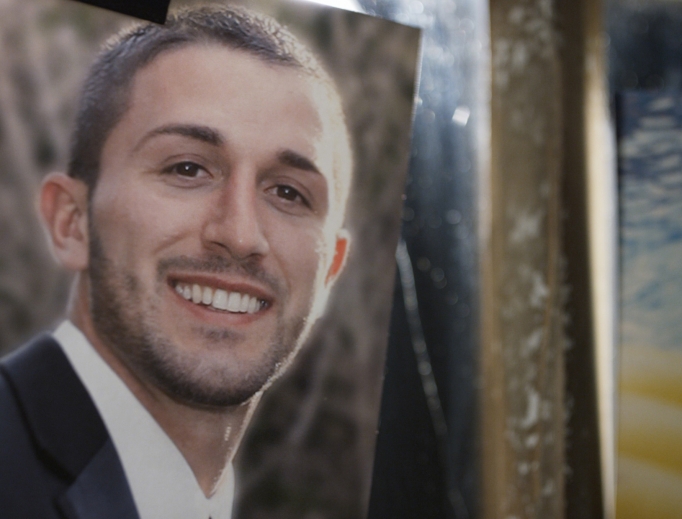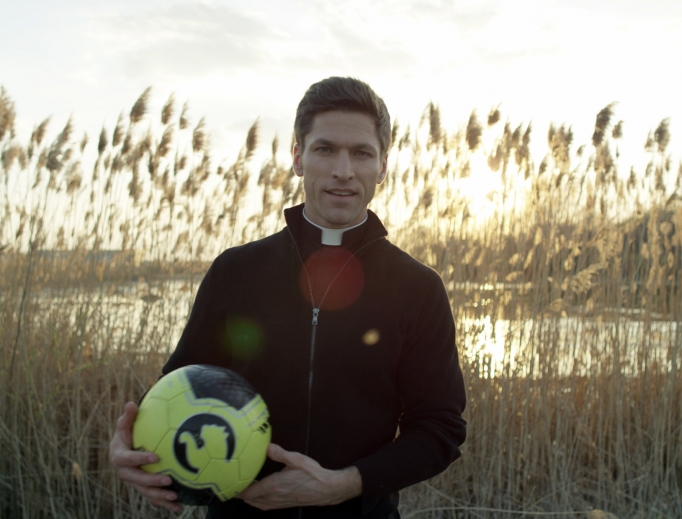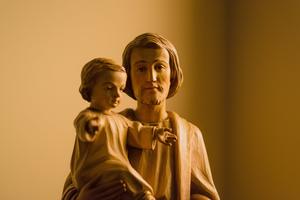Catholic Fathers Challenge Themselves — and Defy the Culture — to Be Real Men
Men’s groups and individuals around the country are pushing back against the notion that masculinity is ‘toxic.’

True manhood is under attack in today’s culture, but that doesn’t mean that Catholic men are not putting up a fight. Whether called to the married state or serving God as a priest, men hearing a call to arms to defend masculinity are making a difference on a national scale, regionally and in their own lives.
Leading the charge, the Knights of Columbus have produced an hourlong nationwide television documentary, Everyday Heroes, which focuses on the lives of 10 men who exhibit the virtues of true manhood. Running on ABC affiliates since May 19, the documentary affords a glimpse of an all-too-rare commodity in today’s culture: true Christian manhood.
Likewise, the Men of Christ conferences held in Milwaukee every year are providing men with an environment in which they can learn about their Catholic faith and go out and be men — and help individual men involved in this apostolate to be heroes to their families.
Know Thyself
In challenging the culture, Father Chad Ripperger told the Register, men must first challenge themselves to learn what true masculinity is. Father Ripperger is a priest of the Priestly Fraternity of St. Peter and regularly offers conferences and talks on spiritual warfare. In his 2014 conference “How to Raise a Man,” Father Ripperger said, “It doesn’t take too much from us to realize that the state of masculinity is in a state of absolutely horrible decline,” adding that “effeminacy is the norm.”
Because of original sin, Father Ripperger said in his conference, males are especially susceptible to sloth and effeminacy, both of which St. Thomas Aquinas defines as “an unwillingness to put aside one’s pleasure in order to do what is arduous” with this difference: “With sloth, it’s an aversion to what’s hard; with effeminacy, it’s an attachment to pleasure — and that’s what’s wrong with effeminacy: It’s a disordered attachment to pleasure.”
Because of effeminacy, men exhibit legitimately “toxic” behavior “in the sense that men are using their authority as the head of a household in a bad way, not for the good of those under him, but for the good of himself and seeking his own pleasure.”
But Father Ripperger said, in contending with effeminacy, men can find an opportunity to become heroes of virtue.
“Men should never shy away from something that is physically painful or emotionally difficult,” he said. “Do it because you know it’s right.”
Answering the Call
The Knights of Columbus’ documentary Everyday Heroes is a nationwide response to that same call for men to learn and live out a proper understanding of masculinity. Produced by the Knights in partnership with the Interfaith Broadcast Commission (IBC), a coalition of Christians, Jews and Muslims to facilitate religious-based television programming, Everyday Heroes features well-known men such as professional baseball players Mike Sweeney (Kansas City Royals) and Darrell Miller (California Angels), who maintain and practice their faith despite the pressures of celebrity.
Everyday Heroes also highlights lesser-known heroes, including Jose Lebrono-Sanbria, a husband and father of two who made it his personal mission to help deliver emergency supplies to victims of the 2017 Hurricane Maria in Puerto Rico, and Air Force pilot Julian Gluck, who served tours in the airspace over Iraq and Afghanistan while also organizing a ground mission to distribute unclaimed troop care packages to civilians affected by war in these regions.
In introducing these manly heroes, Supreme Knight Carl Anderson says that he hopes their stories will help address what he calls “a crisis of heroes.”
“In one recent poll, 51% of young people said they could not name a single adult that they would consider a hero,” he says in the documentary, “but perhaps we have been looking for our heroes in the wrong places.”
Anderson says that today’s culture mistakes celebrity for heroism, but true heroism is hiding in plain sight.
“If we look in the right places, we can see there are heroes all around us who are woven into the tapestry of American society,” he says. “Often they are unknown and unacknowledged because they have no interest in publicity. They are too busy thinking of others.”
One standout in the documentary, Joseph Reali of Woodbury, New York, was a “typical” Catholic boy who loved playing football — but loved his family and faith even more.
“A lot of people are telling us that he reminds us of the Italian Pier Giorgio Frassati,” said his father, Michael Reali, “and after reading about him, I see the similarities are so strong.”

Like Frassati (1901-1925), an Italian youth who was beatified in 1990, Reali was devout in his faith, involved in athletics and had a lively social life — and, tragically, Reali’s life on earth also ended too soon. On Jan. 16, 2015, two weeks short of his 26th birthday, Reali collapsed and died in his family home due to an enlarged heart. Among the many ways in which Reali’s community honored him (“thousands,” his father says, attended Joseph’s funeral), the Woodbury Knights of Columbus council formed in 2015 was named #16261 Joseph Mario Reali Council in his honor.
His is just one story that is making an impact.
“Everyday Heroes is airing in about 80% of the 212 ABC affiliates around the country,” said David Naglieri, the documentary’s writer and director, who also noted that the Knights of Columbus will be making the documentary available in the near future on DVD and through the Catholic television networks, including EWTN. Naglieri told the Register that, based on the performance of similar projects he’s helmed in the past (including a prime-time documentary on Our Lady of Guadalupe), he expects between 1 million and 2 million viewers to watch Everyday Heroes.
The strength of the documentary’s narrative, Naglieri said, allows the power of heroism to speak for itself.
“The greatest storyteller, Jesus, told parables,” he said. “If you look at TV and films, that same use of narrative touches our souls. … It’s also a way to reach a broader audience with what we hope is a new way to look at heroism and masculine character.”

Men of Christ
Kevin O’Brien has taken up this same challenge to live as an everyday hero with Christ as his premiere model. Co-founder of Men of Christ, a men’s outreach that hosts an annual men’s conference in Milwaukee, O’Brien has been helping to provide men a path forward through the cultural morass — the same morass that he had been rescued from in his own return to the Catholic faith.
A professional football player, O’Brien signed on as a linebacker for the Buffalo Bills (1993) and then with New England Patriots (1995) after playing the 1995 spring season in the World Football League Draft in Europe. An injury while with the Patriots sidelined his football career, but along the way, he rediscovered his Catholic faith.
“I came back, entered into the sacrament of confession after being away for 15 years,” he said. “I grew up Catholic but fell away from the faith. Not intentionally, but I grew up in the 1970s, when we didn’t learn what we believed or why we believed what we believed. That’s why I’m so protective — I have seven children — about making sure my family knows the faith.”
The Men of Christ conference features confession, catechesis, inspirational talks, fellowship and is empowered by prayer throughout the daylong event, including a closing Mass celebrated by Milwaukee Archbishop Jerome Listecki. In the latest effort to recruit and train men in the faith, O’Brien said, last year, the Men of Christ team started the Catholic Men’s Leadership Alliance, which seeks to collaborate with dioceses around the country — and the world — to form Catholic outreach programs similar to Men of Christ.
O’Brien hopes that Men of Christ will encourage more men to take an active role in fighting against the anti-Catholic culture, O’Brien said, by “going out into the world to engage the evil outside the home so it doesn’t come into the home.”
Man of Christ
As a member of the Men of Christ — and its communications officer — Jim Michaletz of Cedarburg, Wisconsin, has taken to heart O’Brien’s advice to go out and do battle with the culture. As the father of five children — Carl, 24, Margaret, 18, Katherine, 16, Madeline, 14, and Xavier, 11 — Michaletz knows the importance of being a hero every day, in big things and small.
Michaletz has made it a habit in his life to stand up for what is right, and he was even willing to witness to the truth about 20 years ago at the expense of his career at a marketing firm that sought the business of Planned Parenthood of Wisconsin. When one of the firm’s partners told Michaletz about the potential new client, his response served as “the beginning of the end of my involvement with that business.”
“I can tell you this,” Michaletz said he told the partner, “there’s no way I would ever sit in on a meeting like that. But if they do set foot in here, I will be in that meeting, and I will tell them everything I think about their organization. So I would suggest that meeting never happens.”
The meeting happened anyway, and so within a year, he had left the marketing firm and started his own company — and he and his wife became pregnant with their second oldest, Margaret.
“I often thought that maybe that was a little bit of the Holy Spirit at work,” he said, “replacing a bad thing with something good.”
But this need for men to assume the masculine role in society and within their families also has an effect on the next generation of men. In a recent commentary in the Register, Anthony Esolen, author of Defending Boyhood, noted that true masculinity isn’t toxic — but what culture is offering to young men is.
“It is not just that we do not give [boys] the strong food their souls need,” Esolen writes. “We give them what is downright toxic. The boys are made to celebrate, against their nature, what is sick and what must put the vulnerable at risk by sick and destructive suggestions. For many boys are vulnerable. … They are the ones who so long for masculine affirmation, they will seek it wherever and however they can find it.”
Michaletz said he is aware that he serves as a model of manhood for both his sons and his daughters, and he has used his Catholic faith as the platform for that model.
“The ultimate sacrifice ever paid was Christ on the cross,” he said. “That is an absolutely beautiful model of masculinity.”
With each of his sons, Michaletz said, he’s had the opportunity to share his walk of faith — literally. When his oldest son Carl was 4 years old, father and son spent Saturday mornings walking a mile from their home to 7am Mass at their parish, St. Francis Borgia, in Cedarburg, and with his youngest son, Xavier, he takes the same walk to attend Monday night Rosary at the parish.
Michaletz wants each of his sons to see whether “it’s important for their father to go golfing on Sunday or to go to Mass on Sunday.”
With his daughters, too, he serves as a model, especially in how he treats his wife of 26 years.
“My wife, Helen Marie, is our ‘Mary’ in the house; she is part of the three-way creation of these beautiful lives we have together — so they should see the work she and I do to give each other help.”
Michaletz thanks his own father as his own greatest living model of manhood. According to his son, Klaus Michaletz was an immigrant from Germany who arrived in the United States when he was 19 years old.
“With everything my father does, he has this permanent smile on his face,” Michaletz said. “Everything he does is done with joy, and yet with a great deal of seriousness.”
According to Michaletz, his father had some simple words of wisdom when it came to being a Catholic man.
“There are two words we do not use together in this house: Those words are ‘good’ and ‘enough,’” he said, quoting his father, and adding with a laugh, “You can hear him saying it with a stern German accent.”
“That’s what my father tried to teach me, and that’s what I try to teach my sons,” Michaletz said, “Be a man for others, giving of yourself and your time.”
Register correspondent Joseph O’Brien writes from Soldiers Grove, Wisconsin.
He speaks about this story, in time for Father’s Day, on this weekend’s Register Radio episode.
- Keywords:
- catholic fathers
- father's day
- fatherhood
- joseph o’brien

















